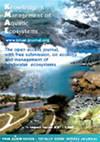Creating life-long anglers: impacts of a high school fishing program on youth fishing, related knowledge, confidence and perception of barriers
IF 1.7
3区 环境科学与生态学
Q3 FISHERIES
引用次数: 2
Abstract
Youth fishing programs are an important gateway into continued fishing participation. With the current focus on R3 (recruitment, retention, and reactivation), it is important to understand the impacts fishing programs can have on their participants' knowledge, confidence, and interest in continuation. In this study, we conducted retrospective pre-post surveys of participants in a high school fishing program in Florida, USA, and compared results to a group of non-participating peers. We found significant increases in knowledge and confidence related to fishing skills among participants and significantly higher skills and confidence reported by participants as compared to non-participants. We also saw higher levels of self-identity as an angler as well as more desire to continue fishing on their own as compared to non-participants. The positive impacts of programs like this are important to the recruitment and retention of young anglers and continued evaluation of their effectiveness will lead to improved outreach programming.培养终身垂钓者:高中钓鱼课程对青少年钓鱼、相关知识、信心和对障碍的认知的影响
青少年钓鱼项目是继续参与钓鱼活动的重要途径。目前关注R3的重点是(招募、保留和重新激活),了解捕鱼项目对参与者的知识、信心和兴趣的影响是很重要的。在这项研究中,我们对美国佛罗里达州一所高中钓鱼项目的参与者进行了回顾性的前后调查,并将结果与一组未参与的同龄人进行了比较。我们发现参与者中与捕鱼技能相关的知识和信心显著增加,并且与非参与者相比,参与者报告的技能和信心明显更高。我们还发现,与非参与者相比,他们作为垂钓者的自我认同水平更高,也更愿意继续独自垂钓。这类项目的积极影响对招募和留住年轻垂钓者非常重要,对其有效性的持续评估将有助于改进推广项目。
本文章由计算机程序翻译,如有差异,请以英文原文为准。
求助全文
约1分钟内获得全文
求助全文
来源期刊

Knowledge and Management of Aquatic Ecosystems
环境科学-海洋与淡水生物学
CiteScore
3.70
自引率
5.60%
发文量
22
审稿时长
>12 weeks
期刊介绍:
Knowledge and Management of Aquatic Ecosystems (KMAE-Bulletin Français de la Pêche et de la Pisciculture since 1928) serves as a foundation for scientific advice across the broad spectrum of management and conservation issues related to freshwater ecosystems.
The journal publishes articles, short communications, reviews, comments and replies that contribute to a scientific understanding of freshwater ecosystems and the impact of human activities upon these systems. Its scope includes economic, social, and public administration studies, in so far as they are directly concerned with the management of freshwater ecosystems (e.g. European Water Framework Directive, USA Clean Water Act, Canadian Water Quality Guidelines, …) and prove of general interest to freshwater specialists. Papers on insular freshwater ecosystems and on transitional waters are welcome. KMAE is not a preferred journal for taxonomical, physiological, biological, toxicological studies, unless a clear link to ecological aspects can be established. Articles with a very descriptive content can be accepted if they are part of a broader ecological context.
 求助内容:
求助内容: 应助结果提醒方式:
应助结果提醒方式:


